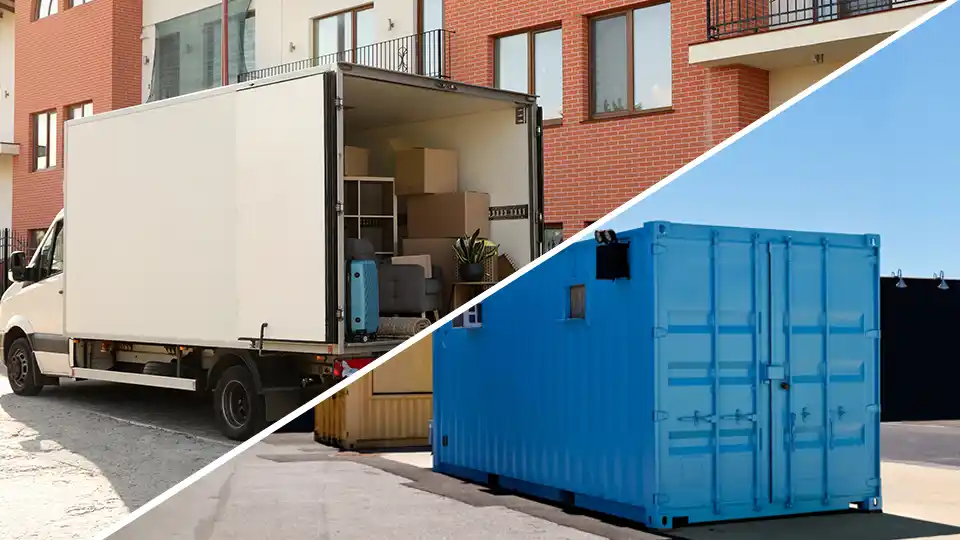Moving Trucks vs. Portable Storage Containers: A Mini Mall Storage Guide

Moving can be a daunting task, and the method for transporting your belongings is likely the most important decision after where you’re moving to. Today, we’re diving into the big question: moving trucks versus portable storage containers. Whether you’re in the heart of Canada or the vast landscapes of the United States, we’ve got you covered with the information you need to make the right choice.
Comparing Options: Moving Trucks vs. Portable Storage Containers
Before we make side-by-side comparisons, it’s essential to consider your high-level callouts. You may choose the more wallet-friendly option if you’re on a budget. If you’re looking for ease of service and are ready to dish out for it, you may go another route.
Let’s break down some of the top considerations to help get you started.
General Costs, Distances, and Warnings
General Costs
- Moving Trucks: Costs typically include rental fees, mileage charges, fuel, and potentially additional equipment fees like moving blankets and straps. Some moving truck companies also have movers on staff to assist for a fee or work with trusted third-party movers that you can book through their website.
Pro tip: Look for moving truck companies or third-party affiliates with verified reviews to ease your mind.
- Portable Storage Containers: Expenses cover container rental, fuel or transportation costs, delivery, and additional services required. Be mindful of additional costs that can arise, especially with long-distance moves. For example, will you need to insure your belongings as they travel?
Distances
- Short Distances: Moving trucks may be more cost-effective for local moves.
- Long Distances: Portable storage containers offer convenience and cost savings for extended journeys.

Warnings
- Hidden Fees: Watch out for hidden charges in both moving truck and portable storage container services. Remember to ask questions upfront. There are plenty of online forums to reference, and always ensure the company you choose is accredited.
Although you incur added fees for credit card payments, paying down payments or deposits this way is often a safer bet than cash or e-transfer.
- Scheduling Conflicts: Ensure availability aligns with your moving timeline, especially during peak seasons. Plan ahead as much as possible for cross-country or long-distance moves. Depending on the company, travel times may exceed 10-14 days.
- Moving Scams: Moving scams occur in North America, with a recent rise in deceptive pricing, holding belongings hostage, and fake credentials being common tactics. To safeguard against scams, research moving companies thoroughly, read customer reviews, insist on a written contract detailing all costs, and verify the company’s credentials and legitimacy before hiring.

| Criteria | Moving Trucks | Portable Storage Containers |
| Flexibility | Limited to designated drop-off points | Delivered to your location or company grounds for pick-up |
| Loading/Unloading | A quick process with ramps | Ground-level loading/unloading Containers may need specific space to load/unload |
| Weather Resistance | Limited protection | Weather-resistant containers for added security |
| Accessibility | Easy to access. May be challenging in remote areas | Easy access, may find fees for remote location pick up/drop off |
| Cost | Fuel costs and rental fees | Container rental, fuel cost, and delivery charges |
Consider This: Canada vs. America
Depending on which part of North America you’re moving in, there are some location-specifics to be mindful of as well.
Canadian Considerations
- Weather Challenges: Canada’s diverse climate demands careful consideration. Portable storage containers may offer better protection against harsh weather conditions, ensuring your items stay safe and dry during the move.
- Distance and Accessibility: The vastness of Canada often means longer distances between destinations. Portable storage containers are convenient for long-distance moves, and their flexibility allows for easy accessibility even in remote areas.
- Service Providers: In Canada, well-known companies like PODS and U-Box by U-Haul offer reliable portable storage solutions.
American Considerations
- Regional Climate Variations: The United States boasts diverse climates, from snowy mountains to scorching deserts. Consider the weather conditions in your region to determine if a moving truck or portable storage container is better suited for your needs.
- Company Options: In the U.S, popular portable storage container providers include PODS, U-Haul, and 1-800-PACK-RAT. Look up their services based on your move and call to ask questions when in doubt.
The Verdict
Ultimately, choosing between moving trucks and portable storage containers depends on your unique needs, location, and preferences. But planning and research can ensure a smooth and stress-free (well, less stressful) move. For more guides on moving, check out our lists of best packing supplies and cardboard vs, moving boxes. Need help with your oversized belongings or other items that won’t move to your new place? Need extra space while you get settled or make renovations? Our self storage units come in convenient sizes, with flexible access hours and 24-hour security for peace of mind. Reserve your storage unit online today or call us to get started.

